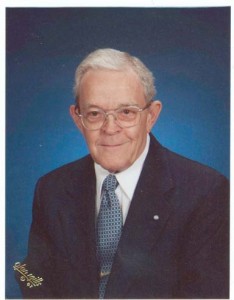This post is part of The Plank Center’s Legacies from Legends in PR Series that was begun in recognition of the 40th Anniversary of the Public Relations Student Society of America in 2007.
Began his PR career as an Air Force public information officer, with a degree in advertising, during the Korean War. Years later, following increasingly important assignments, appointed Air Force Director of Public Affairs and promoted to brigadier general, the first PAO to hold this position and rank. After retiring in 1980, held senior-level PR positions in several large companies and was a solo PR counsel for three years. Served as PRSA President in 1990, the founding PRSA Foundation President in 1991 and received PRSA’s Gold Anvil Award in 2007.
Congratulations! You are about to enter the most interesting, challenging, frustrating, rewarding and satisfying profession. Here are hints to help you along. They helped me and many others I know.
- Work hard, master your job quickly: There is no substitute for hard work. “Come early and stay late.” Mastering every aspect of your job is critical. When you have done this, better jobs and more pay will quickly follow. Some PR functions are more fun and satisfying than others, but the versatile person learns how to do them all. Understand your organization’s business, and how its money flows. Always remember: Your present job is the most important one you will ever have.
- Be a team player: PR is a team sport. You will often need support and help from others. Give them credit, and reciprocate the favor. Watch your ego. A sports team with individual stars is no match for one whose members play together supporting one another.
- Volunteer: Promotions come to those who volunteer for tough, more demanding jobs – proving they are capable of bigger things. Do the job no one else wants to do. Caution: Don’t overload yourself. Learn when (and how) to say “no.”
- Pay back: Guest speakers, mentors and advisors have helped you, and you will have many more during your career. You also need to be a mentor, guide and supporter. Become an active PRSA member. You’ll be amazed at how much you can learn as a PRSA volunteer.
- Keep track: Start a list of contacts now, keep it current. Stay in touch with them as much as you can.
- Act honestly and ethically — always: Only you can build your reputation; only you can harm or destroy it.
- Take care of your people: When you become a supervisor, learn from your people and treat them as you want to be treated. Give thanks publicly; critique shortcomings quietly. A plaque on my wall says it all: “All of us are smarter than any of us!”
- Judge PR competitions: Seek opportunities to judge PR competitions. They are a fantastic source of fresh ideas.
- Stay current: Read your local newspaper and at least one national paper. Use PRSA’s excellent in-person and electronic seminars, especially the breakout sessions at conferences. Read the bios of the giants of the profession.
- Serve your community: Be a good citizen. Get involved in organizations that help others and improve your community. Pro bono work can be a good learning experience.
- Take time to smell the roses: Public relations is a demanding profession. Stay fit, and recharge your batteries often. Go fishing. Take a nap in a hammock, under a tree or at the beach. Go to a concert, visit an art gallery, museum or arboretum. Read for pleasure: fiction, history, biography, poetry.
Welcome to public relations. The day when you’ll be writing suggestions like these for new graduates is not far off, so be prepared. Good luck, and Godspeed!
Published: 2009